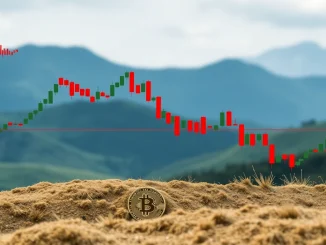
Geopolitical events often send ripples through global markets, and the current situation between the United States and Iran is no exception. For those tracking cryptocurrencies, understanding these macro dynamics is key. Rising US Iran tensions present a significant factor that could influence market sentiment and price action.
How Are US Iran Tensions Shaking Global Markets?
Reports indicate a dangerous escalation in the standoff between Washington and Tehran. According to information cited by Walter Bloomberg on X, based on The New York Times, Iran is reportedly preparing for potential U.S. action. This includes readying missiles and military assets capable of striking U.S. bases in the region should the conflict widen.
Adding to the gravity, CNN previously reported on discussions within the White House. President Trump was reportedly considering direct military strikes against Iran’s nuclear facilities. These considerations included using advanced weaponry like bunker-busting bombs and stealth bombers, highlighting the serious nature of the potential response being weighed.
Understanding the Geopolitical Risk Landscape
This situation exemplifies significant geopolitical risk. Geopolitical risk refers to how political events and instability around the world can impact international relations, trade, and financial markets. When major powers or strategically important regions face conflict or severe tension, it creates uncertainty that investors dislike.
In this case, the potential for direct confrontation between the U.S. and Iran introduces a high degree of unpredictability. The Middle East is critical for global energy supplies, and any military action there can have immediate and far-reaching economic consequences, impacting everything from oil prices to supply chains.
Could Military Conflict Trigger Market Chaos?
The prospect of open military conflict is a major concern for financial markets. Historical events show that military engagements, especially involving significant nations, often lead to sharp market reactions. The fear is that direct strikes or retaliatory actions could spiral into a wider conflict, disrupting global stability.
Consider these potential outcomes and their market implications:
- Limited Strikes: Might cause an initial shock but markets could recover if seen as contained.
- Wider Conflict: Could lead to sustained market downturns, significant increases in oil prices, and a flight to perceived safe-haven assets.
- De-escalation: A diplomatic solution or cooling of rhetoric would likely be positive for markets, reducing uncertainty.
The current environment keeps market participants on edge, closely watching for any developments that could signal a shift towards either conflict or de-escalation.
Is Your Portfolio Ready for Market Volatility?
Increased geopolitical tension almost guarantees a rise in market volatility. Volatility is the rate at which the price of an asset or security changes over time. High volatility means prices can change dramatically and quickly in either direction. This is particularly true for risk assets like stocks and cryptocurrencies during times of global uncertainty.
Here’s why volatility spikes:
- Uncertainty: Investors react to news, often making quick decisions based on fear or speculation.
- Risk Assessment: Traders re-evaluate the risk associated with holding assets during unstable times.
- Liquidity Shifts: Capital may move rapidly between different asset classes, causing price swings.
For cryptocurrency holders, this means being prepared for potentially sharp price movements. While crypto markets have their own drivers, they are not immune to global macroeconomic and geopolitical forces.
How Does Geopolitical Stress Cause Crypto Impact?
The direct crypto impact from geopolitical events like rising US Iran tensions can be complex. Historically, Bitcoin has sometimes been framed as a potential ‘digital gold’ or safe haven, but its price behavior during crises is not always consistent. More often, crypto markets tend to correlate with broader risk asset classes like tech stocks.
Therefore, if geopolitical risk leads to a general sell-off in risk assets, cryptocurrencies could also face downward pressure. Conversely, extreme uncertainty could, in some scenarios, lead investors to explore alternative assets outside traditional financial systems, though this is less predictable.
Key points regarding crypto impact:
- Increased correlation with traditional markets during crises.
- Potential for heightened volatility alongside other risk assets.
- The ‘safe haven’ narrative remains debated and inconsistent in practice.
Monitoring the geopolitical landscape is crucial for understanding potential market shifts that could affect your crypto holdings.
Conclusion: Navigating Uncertainty
The escalating US Iran tensions serve as a stark reminder that global events significantly influence financial markets, including the dynamic world of cryptocurrencies. The interplay of geopolitical risk, potential military conflict, and subsequent market volatility creates a challenging environment.
While predicting the exact outcome or market reaction is impossible, staying informed about these developments is vital. The potential for significant crypto impact underscores the need for vigilance and a clear understanding of the risks involved in navigating volatile markets driven by complex global factors.



